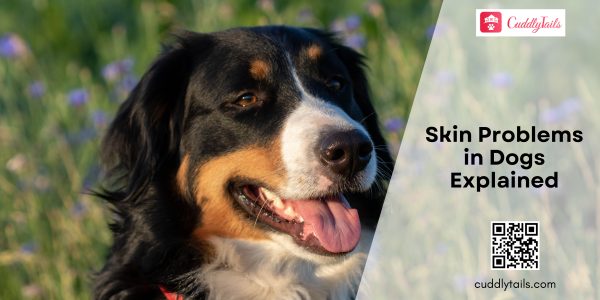Managing Skin Problems in Dogs: Sores, Scabs, and Crusts Explained
Sores, ulcers, scabs, or crusts on a dog’s skin can cause significant discomfort and may indicate underlying issues like infections, allergies, or autoimmune conditions. While some skin problems in dogs are mild and temporary, others may signal underlying infections, allergies, or more serious health problems. Because dogs often scratch, lick, or bite at affected areas, small sores can quickly worsen, leading to pain and risk of infection.
Understanding Skin Problems in Dogs
What Are Skin Sores and Ulcers?
A sore or ulcer is an open wound or lesion on the skin that may appear red, moist, or raw. Unlike simple scratches, ulcers typically do not heal on their own quickly and can deepen over time if untreated.
What Are Scabs and Crusts?
Scabs form as part of the natural healing process when blood clots over a wound. However, persistent or widespread scabbing often points to ongoing irritation, infection, or skin disease. Crusts, which are hardened or flaky layers on the skin, can also develop from chronic inflammation or infection.
Common Causes of Sores, Ulcers, and Scabs
Allergies
Environmental triggers like pollen, dust mites, or certain foods can cause itching and irritation. Continuous scratching or licking may lead to open sores and scabs.
Parasites
Fleas, mites, and ticks are notorious for causing intense itching and skin trauma. Mange, caused by microscopic mites, often leads to scabby, crusted skin and hair loss.
Bacterial and Fungal Infections
Skin infections, such as staphylococcal dermatitis or ringworm, can cause sores, scabs, and crusty patches that spread if left untreated.
Trauma or Self-Inflicted Wounds
Dogs that chew or lick excessively due to anxiety, pain, or irritation can create open sores. Hot spots (moist dermatitis) are a common example of this.
Autoimmune and Hormonal Disorders
Conditions such as lupus, pemphigus, or hypothyroidism can weaken the skin’s defenses and lead to chronic sores and ulcers.
What You Can Do at Home
Gentle Cleaning
If your dog has a small sore or scab, gently clean the area with a mild, vet-approved antiseptic solution. Avoid harsh human products like hydrogen peroxide, as they may damage healthy tissue.
Prevent Licking and Scratching
An Elizabethan collar (cone) or protective clothing can help prevent your dog from aggravating the wound while it heals.
Improve Skin and Coat Health
Providing a balanced diet rich in omega-3 fatty acids supports skin repair and resilience. Regular grooming also helps detect and address skin issues early.
When to See a Vet For Skin Problems in Dogs
Signs of Infection
If sores appear red, swollen, oozing pus, or have a foul odor, professional treatment is necessary to prevent deeper infection.
Persistent or Worsening Skin Issues
If scabs or ulcers do not heal within a week or seem to spread, your vet should examine your dog to identify the underlying cause.
Severe Itching or Pain
When sores are accompanied by constant scratching, whining, or visible discomfort, it often indicates a medical issue beyond simple irritation.
Systemic Symptoms
Lethargy, appetite changes, fever, or weight loss alongside skin problems could signal a systemic illness that requires urgent care.
If you suspect any of these symptoms, or if you have any other doubts, you can reach out to a Cuddlytails vet here.
Treatment Options For Skin Problems in Dogs
Veterinary Diagnosis
Your vet may perform skin scrapings, cultures, or blood tests to determine the root cause of the sores or ulcers.
Medications
Depending on the diagnosis, treatment may include antibiotics for bacterial infections, antifungal medications for ringworm, or anti-parasitic drugs for mites and fleas.
Allergy Management
If allergies are the culprit, your vet may recommend dietary changes, antihistamines, or allergy testing to identify and eliminate triggers.
Long-Term Care
Chronic skin conditions often require ongoing management through regular vet visits, medicated shampoos, supplements, or prescription diets.
Prevention and Long-Term Care
Regular Grooming and Skin Checks
Brushing your dog not only keeps their coat healthy but also allows you to spot early signs of skin trouble before they worsens.
Parasite Control
Staying consistent with flea, tick, and mite prevention greatly reduces the risk of sores and scabs caused by infestations.
Balanced Nutrition
High-quality food with essential fatty acids helps maintain strong skin barriers and reduces the likelihood of chronic irritation.
Stress Reduction
Providing a stable environment, adequate exercise, and mental stimulation minimizes stress-related licking or scratching that can cause sores.
Conclusion
Sores, ulcers, scabs, and crusts on your dog’s skin should never be ignored. While some may be minor and heal quickly, others can indicate more serious underlying problems. Early intervention—whether it’s cleaning a wound at home, improving nutrition, or seeking veterinary treatment—can prevent complications and keep your dog comfortable. By staying proactive with grooming, parasite prevention, and regular vet visits, you can help your furry friend enjoy healthier skin and a happier life.
FAQs
Why does my dog have sores or scabs?
Common causes include allergies, parasites, infections, trauma, or autoimmune diseases. A vet can diagnose with skin tests or biopsies.
Is a sore or scab an emergency?
Seek emergency care for rapidly spreading sores, swelling, breathing issues, or severe pain, as these may indicate allergies or infections.
Can I treat my dog’s sores at home?
Avoid human ointments or cleaning solutions, as they can be toxic. Use vet-approved wipes or shampoos and consult a vet for treatment.
How can I prevent sores or scabs?
Use year-round flea prevention, hypoallergenic diets, regular grooming, and vet checkups. Minimize allergen exposure and manage stress.
What treatments are available for sores or scabs?
Treatments include antibiotics, antifungals, allergy medications, or surgery for tumors, with medicated shampoos and cones for support.

